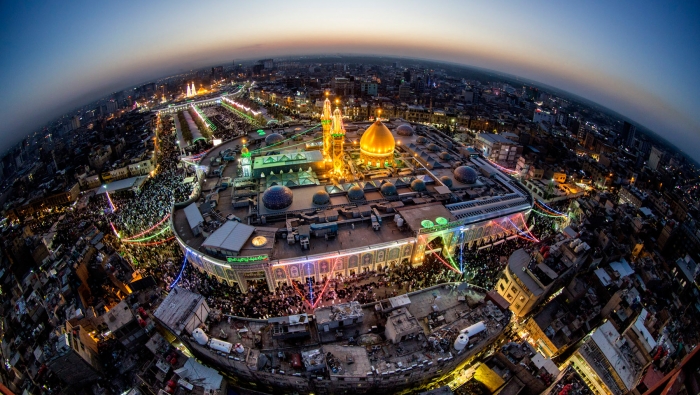What do you know about Karbala?

Karbala is a very ancient city; it has been known of since Babylonian times and its name dates from before the
Islamic conquests. Considered one of the cities of Tassuh al-Nahrayn which lie on the river of Balakubass (the old
Euphrates), the land of Karbala included an ancient temple for Christians.
It is an Iraqi Islamic city, mostly famous in pre-Islamic times, and possesses a great and varied history; most notably it
witnessed the unique event, which was noble martyrdom and sacrifce of Imam al-Hussain, on the10th of Muharram
61 A.H.
Location
Located about 105 km Southwest of the capital Baghdad at 32.61°N, 44.08°E, Karbala lies on the edge of the desert west of the Euphrates river and on the left side of the Hussainiyya Canal. To the West and North is Al-Anbar province; Najaf province borders the city from the South; while the Eastern side leads to Babylon province and some outlying districts of Baghdad.
The climate is damp, very hot in summer, and mild in autumn; its land is watered by the canals of the Euphrates
river. Karbala has many orchards, it has flat lands suitable for various forms of agriculture, and all sides of the city are
surrounded by fruit trees and palm groves.
Etymology
Some researchers say the name ‘Karbala’ means ‘Closeness to God’ and that it is of ancient Babylonian origin; others think that the meaning derives from the Babylonian ‘Kor Babil’ which means ‘ancient Babylonian towns’, including Nainawa, Ghadiryia, Karbala, Aker Babil,Nawawes and Herr which is now called ‘Ha’ir’ in Arabic, which means ‘the land which refused to allow water into it’ and this was said when al-Mutawwakil al-Abbasi ordered that water be directed to flood the plain of Karbala in order to destroy the grave of Imam al-Hussain, the water stopped short and did not harm the holy grave.
In another view, the word ‘Karbala’ was thought to be a compound Assyrian word, the frst part being ‘Karb’ meaning ‘Sanctuary’ and the second is ‘Ala’ meaning ‘God’, thus forming the word ‘The Sanctuary of God.’
Other historians believe the origin may be Persian, formed from the word ‘Kar’ meaning ‘Deed’ and “Bala” meaning ‘High’.
Karbala is often called al-Taf. It may also be that the name ‘Karbala’ is derived from the Arabic word ‘Kurba’ meaning ‘Soft Earth.’ Some scholars also maintain that it is a composite noun in the Arabic language, formed of ‘Karb’ meaning ‘Grief’ and ‘Bala’ meaning ‘Misfortune.
Real History of Karbala
The actual history of Karbala begins with the arrival of Imam Hussain, peace be upon him, at the plain of Karbala in
Muharram 61 A.H. when he was prevented from proceeding towards al-Kufa by the Umayyad troops. Imam Hussain,
peace be upon him, was martyred in Ashura along with members of his family and his companions.
In the centuries since the martyrdom of Imam Hussain, Karbala developed into one of the most famous Islamic cities,
and through the grace of God, the city has become a city of faith and numberless Muslims long to come to this city to pray at the shrine of Imam al-Hussain, peace be upon him, indeed the city also known as the City of al-Hussain.
It was because of this that Karbala began to grow, develop and flourish.





